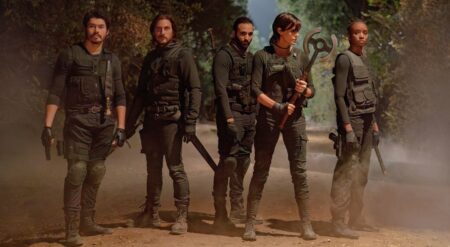
Sundance 2021’s NEXT program promises films that take a “forward-thinking approach to storytelling,” valuing innovation and experimentation. If the goal of this category is to highlight filmmakers with an ear to the pulse of culture, then Director Carey Williams earns his place with R#J. A masterclass in bold storytelling, this film unites traditional filmmaking with the ever-popular screenlife format for an inventive retelling of Romeo and Juliet.
At this point, there is no such thing as a fresh take on Shakespeare’s romantic tragedy. This story has long been exhausted and, honestly, the same can be said of the screen life genre (though it has a mere 20 years to Romeo and Juliet’s 400). Amplifying the film’s problems is the fact that we’ve all been staring at our screen for the past 12 months: with those factors combined, R#J’s premise sounds exhausting. It should be impossible for this film to hold an audience for 90 minutes — and, in truth, it sometimes struggles to do so. Still, R#J’s inarguable success is communicating the sheer talent and artistry behind its production.
The film’s plot needs little explanation; it’s the same story of two star-crossed lovers from rival houses trying desperately to escape a predetermined destiny. Reframed in the present day, R#J presents Montague and Capulet as Gen Zers processing the violence of their world through their phones. As much as this film is about their love, it also takes time to examine the way we form connections in the digital age. In a way, Romeo and Juliet has always been a commentary on communication (and the lack thereof); playing off themes of distance and miscommunication, R#J contends that being more connected does not make us better at communicating with each other.
Camaron Engels and Fracesca Noel have immediate chemistry as Romeo and Juliet. Though their bond is initially formed through text messages, when given the opportunity to share the screen, their connection comes through with the earnest energy of first love. Also displaying immense talent, Siddiq Saunderson’s Mercutio steals the show. He has a natural charisma and magnetism, perfectly suiting him for some of the film’s funniest lines. In terms of its script, R#J’s combination of modern dialogue with Shakespearean prose makes for a subversive translation. There is a unique power to layering a classic into the modern-day — it’s why we get at least one Shakespeare adaptation a year — but William’s script, penned alongside Rickie Castaneda and Alex Sobolev, demonstrates a necessary understanding of this story’s original prose. There is power in poetry and Shakespeare’s plays were all about intentional language. Williams matches that with lyricism to the film’s modern dialogue, which is often used to great effect and hilarious interjections.
R#J is all-around a strong display of young talent — but the film itself struggles under the weight of its gimmicks. While the screenlife format provides a structure for the cultural commentary, it also causes many of the film’s greatest problems. Too often, viewers are cheated out of the actors’ natural chemistry by the need to physically separate them. Seeing Romeo and Juliet in a skype call or through rapid Instagram messages lacks the energy of the few scenes they actually get to share. The same can be said of the story’s more dramatic moments and revelations; what could have been opportunities for the actors to show off their chops are stunted by the screenlife delivery. Williams is undeniably clever, finding inventive ways to visualize communication, but is inevitably limited in his choices. Sometimes no matter how creative his concept, a shared scene is still the obvious preference.
Inevitably, the story also suffers from its legacy. Romeo and Juliet is so ingrained in our culture and imprinted in our minds that there are little surprises left to discover. Despite clever artistic choices and attempts to subvert expectations, the film is restrained within the beats of its story. At times, it almost seems to be stalling: the audience knows what the next beat is and has to wait 15 minutes or read 20 text messages to get there. Adding to that frustration is all the ways the film is able to succeed. The purity of Williams’ storytelling outside of the screenlife format is so powerful you begin to wonder what the film would look like with the same sense of flair but less screens.
Calling R#J derivative is a waste of breath. That characterization is inherent to any story this widely known and the film still does its fair bit of playing with that expectation. The problem is not the familiarity itself, but the way it boxes the story in, limiting its ability to reveal the creatives behind the production. Screenlife is yet another box confining that talent. While R#J doesn’t quite find a way to be refreshing, it relishes in its boldness. With undeniable charm and a gorgeous visual aesthetic, R#J is an exciting showcase of talent, providing a thorough list of Hollywood up and comers.
R#J
-
Rating - 6.5/106.5/10
TL;DR
Despite being a modern twist, R#J is boxed in by its well-defined story beats and the screenlife format similarly limits the film’s creative possibilities. While it isn’t quite refreshing, the film is bold, inventive and fueled by the sheer talent of everyone involved.






